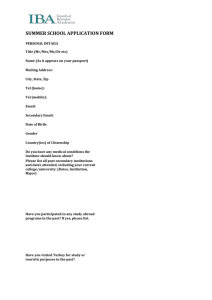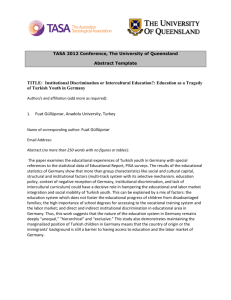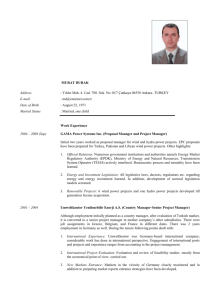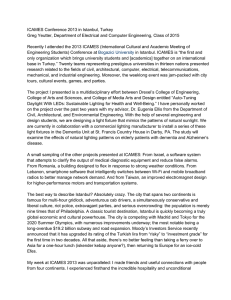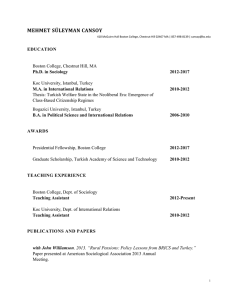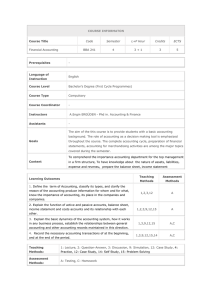C. JOHN BURK S . Translated from the Turk-
advertisement
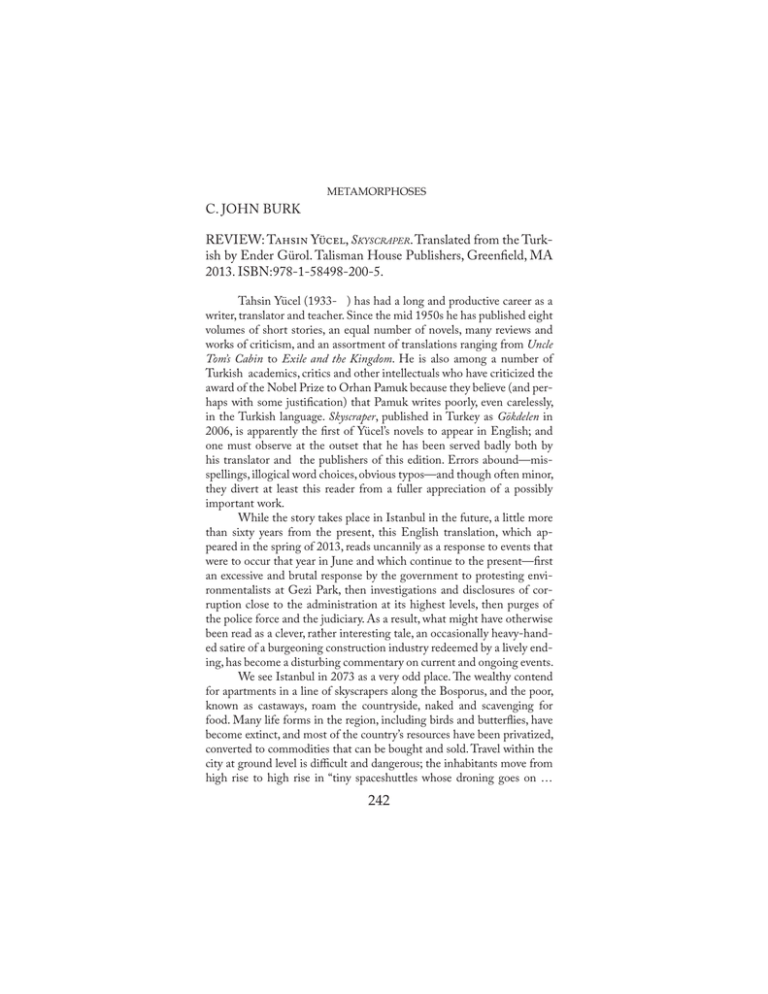
!"#$!%&'(%)") C. JOHN BURK REVIEW: Tahsin Yücel, SKYSCRAPER. Translated from the Turkish by Ender Gürol. Talisman House Publishers, Greenfield, MA 2013. ISBN:978-1-58498-200-5. Tahsin Yücel (1933- ) has had a long and productive career as a writer, translator and teacher. Since the mid 1950s he has published eight volumes of short stories, an equal number of novels, many reviews and works of criticism, and an assortment of translations ranging from Uncle Tom’s Cabin to Exile and the Kingdom. He is also among a number of Turkish academics, critics and other intellectuals who have criticized the award of the Nobel Prize to Orhan Pamuk because they believe (and perhaps with some justification) that Pamuk writes poorly, even carelessly, in the Turkish language. Skyscraper, published in Turkey as Gökdelen in 2006, is apparently the first of Yücel’s novels to appear in English; and one must observe at the outset that he has been served badly both by his translator and the publishers of this edition. Errors abound—misspellings, illogical word choices, obvious typos—and though often minor, they divert at least this reader from a fuller appreciation of a possibly important work. While the story takes place in Istanbul in the future, a little more than sixty years from the present, this English translation, which appeared in the spring of 2013, reads uncannily as a response to events that were to occur that year in June and which continue to the present—first an excessive and brutal response by the government to protesting environmentalists at Gezi Park, then investigations and disclosures of corruption close to the administration at its highest levels, then purges of the police force and the judiciary. As a result, what might have otherwise been read as a clever, rather interesting tale, an occasionally heavy-handed satire of a burgeoning construction industry redeemed by a lively ending, has become a disturbing commentary on current and ongoing events. We see Istanbul in 2073 as a very odd place. The wealthy contend for apartments in a line of skyscrapers along the Bosporus, and the poor, known as castaways, roam the countryside, naked and scavenging for food. Many life forms in the region, including birds and butterflies, have become extinct, and most of the country’s resources have been privatized, converted to commodities that can be bought and sold. Travel within the city at ground level is difficult and dangerous; the inhabitants move from high rise to high rise in “tiny spaceshuttles whose droning goes on … !"! !"#$%&'()*+ somewhat like household flies.” The governments of both the city and the Turkish state are dysfunctional and hopelessly corrupt. Contributing to this unfortunate situation are the ambitions and activities of a ruthless yet sentimental developer named Temel Diker. Inspired by a visit to America in the early 2060s, Temel hoped to rebuild Istanbul according to a “new prototype” of identical buildings, all the same height and arranged in numbered ranks. He would also erect on Seraglio Point a statue of Liberty three or four times larger than the original in New York harbor. Its head would bear the face of his own mother, an incomparably beautiful woman named Nokta, who had died shortly after he was born. [Complex symbolism is probably involved here; Nokta was the name of a major Turkish political news magazine that published diaries with plans for a possible coup. It was closed under pressure from the military in 2007, shortly after the Turkish publication of this novel.] As the novel begins, its protagonist, Can1 Tezcan, Temel Diker’s lawyer, is waking from a nightmare. His wife Gül reminds him that he must be in court that morning to represent a friend from their student days, Varol Korkmaz, who has been detained for two years for no apparent reason. Can in his student days, we learn, had been a Marxist revolutionary, but has prospered since by working for the wealthy and powerful. Although he views his client with amusement and occasional contempt, he is also impressed by Temel’s energies and the utopian nature of his vision. The hearing goes badly and Can rushes from the room in anger. Outside he meets another comrade from his Marxist youth– Rıza Koç, who has just been released from prison and who asks for funds to help support a forthcoming publication. [Since in real life the Koç family is extremely wealthy, Turkish readers would recognize the irony in Rıza’s patronymic. Similarly, Temel is a generic nickname applied to Turks from the Black Sea area; there are “Temel jokes,” including at least one that involves the Statue of Liberty.] Can writes a generous check and joins Sabri, his assistant, on the way to Temel’s office. He finds Temel distressed and eager for news of progress in his efforts to acquire through legal means a plot of land in the Cihangir district of the city, “a ramshackle house, three pine trees, a mulberry tree, a pomegranate tree, and a stunted hazelnut…” The owner of the property is a retired teacher whose last name is Şirin [likeable, even lovable in Turkish] who has refused to move for sentimental reasons; “I inherited this house from my brother. My two sons were born here, my wedding was 1 Can is pronounced like the English name John. !"# !"#$!%&'(%)") celebrated here, and my wife died here. I won’t sell it for the world.” Şirin could be a descendent of Voltaire’s “good old man taking the fresh air at his door under an orange bower” outside Constantinople at the conclusion of Candide. [Some geography may be helpful. The Cihangir district is in the modern, “European” section of Istanbul, southeast of Taksim Square on the slopes leading down to the Bosporus. From the old man’s property, one would look southward along the Bosporus to see Seraglio Point, the promontory that separates the Golden Horn from the Sea of Marmara. The Topkapi Palace lies directly above Seraglio Point in the Old City.] Can reports that the case has been deferred and suggests that the judge’s “strategy might simply be to defer the case indefinitely … until the other party is fed up and admits defeat.” Temel insists that he needs the land and Can replies that he thinks they can never win their case. He proposes a radical solution: “the privatization of judgment, that is of the administration and procedural law, like everything else. In the strictest sense of the word, selling totally an activity controlled by the government to private investors, to some big shot like you.” Temel asks “Will this enable me to get that piece of land from that man?” and Can replies “Just imagine that you have purchased the institution of justice and appointed me at its head! Who would challenge us anymore?” After some discussion of their goals–Can would be able to get his friend Varol out of prison; Temel would be able to erect his statue of Liberty at Seraglio Point–they turn to the Press for help. Can then seeks out another old friend from his radical student days, Cüneyt Ender, now a writer for a Turkish paper called The Globe, “a tabloid press…with pictures and pin-ups”, but also “able to make the public believe the most improbable things….” Can and Cüneyt reminisce on their revolutionary exploits and recall a fallen comrade, Tufan Şirin…“Shot before the end of the year. …Tufan wrote a poem about the struggle. He himself did not know how to fight.” Can outlines his proposal and Cüneyt is soon entranced by the utopian nature of the scheme. Back at home he shares his thoughts with Gül; she too objects at first but their disagreement is displaced by old affections: “Can took her in his arms and carried her to the bedroom where she undressed, and they began making love. When their passion was satiated, she asked, ‘How could a mere newspaper article set off a chain reaction?’” They quickly learn the answer to her question. Cüneyt’s article creates a sensation; Can is called to Ankara to meet with the Minister of Justice, Veli Dökmeci and a meeting is arranged with the Prime !"" !"#$%&'()*+ Minister, Mevlut Doğan. Rıza Koç soon appears at Can’s apartment, full of enthusiasm about his new book, Herds of Castaways. It describes “a host of people, the elderly and the young, male and female, adults and children, an army of the starving, deprived of all clothing, wallowing in hills and valleys like primitive tribes. They eat whatever they can find, earthworms, frogs, wild herbs, bark and algae. They even fight over a dead crow.” Can and Gül are disbelieving, and after some discussion the three old friends decide not to think about the matter further. The next day Can calls on Mevlut Doğan, whom he despises, reflecting beforehand that if “such a man as that could be the Prime Minister, you knew that you could never fully understand the nation that elected him.” Mevlut Doğan agrees at once that justice should be privatized and he also agrees to have Varol Korkmaz released from prison. The Prime Minister admits that he already knows about the condition of the castaways, but their condition is not reported in the news because “Any mention of them might upset the economy: . . . These people are a sturdy species, though, much like your species and mine.” He laughs and then says that lives of the castaways have improved during his term in office since “our municipalities dump their refuse at spots where there are many of them.” Can then returns home to find Rıza Koç still taking refuge. On May16. 2073, justice is officially privatized by a vote of the Turkish Grand Assembly with the approval of the Minister of Justice. Law would now be administered by a new agency, the Turkish Basic Law Partnership Corporation, known as the TBLPC, with Can as its chief executive officer and his assistant Sabri its secretary general. A contract is signed by the Minister of Justice and Sabri, acting in his new capacity, accepts the entire Turkish justice system for the Corporation. Now, as one speaker remarked, “…the court is a supermarket. It’s at our disposal, ready to serve us, and we must never forget this!” Meanwhile, Temel’s attempts to acquire the old teacher’s property remain stalled in the courts and, impatient with Can’s attempts to move the suit along, Temel decides to visit the Cihangir district and negotiate directly with the owner. The two men have a surprisingly friendly conversation. Temel explains that he needs the property because the Statue of Liberty of Istanbul will look best from there. The old man insists that he will never sell. From this point on, the pace of the book quickens. The TBLPC with Can as CEO is inaugurated in a ceremony on the 124th floor of a newly built skyscraper that is jokingly called “the Justice Tower.” There !"# !"#$!%&'(%)") Can learns that the municipal government of Istanbul has decided to expropriate Şirin’s house and demolish it. Two days later city officials arrive at the house and order Şirin to pack his belongings and leave; Şirin resists, then shoots and injures one of the men who had taken the photo of Şirin‘s martyred son Tufan from the wall. The officials retreat but return later with machine guns. A fire fight ensues and the old man “was now the target, and a minute later his identity could have been determined only by chemical analysis…The house and the garden were bulldozed, and the site smelled of fresh earth.” Surprisingly, Temel regrets Şirin’s death and arranges a sumptuous burial. He then takes Can to see the Statue of Liberty, rumored to be “the invention of Americans or devils.” They pass along a giant cylinder of computer-generated light, popularly known as “Vertical Rainbow”; then, in a spaceshuttle, fly around the statue’s head. Can is overwhelmed by the image of Nokta, Temel’s mother, but is brought out of his reveries when Sabri informs him, the next day at the office, that justice in Turkey, through a complicated plot turn, will now be administered by the Mafia. He goes home to find Gül reading The Overbidding, another new book by Rıza Koç a critique of the new justice system. Riza appears at the door, seeking refuge again. When Can protests, “You have ridiculed me and my objectives,” Rıza responds, “Had you remained loyal to the ideals of our youth wouldn’t you have acted in the way that I have? Once you were among the most ardent Marxist militants. Then, what happened? You preferred to take sides with the people in power…my duty is to criticize, and as long as there is criticism there is hope.” The next day a stranger appears at Can’s office, speaking perfect Turkish but with an American accent. He is the younger brother of Tufan Şirin and he demands that his father’s murderers be punished. Can protests that the killing was a misunderstanding and his visitor replies, ”I see, yet for a misunderstanding so many policemen, guns, and bullets.” Can returns home in despair but now Rıza comforts him, reflecting that “Actually none of us can be said to be responsible for our actions and our actions prevent us from fulfilling our objectives…Our sole consolation is that we are not among those who submit. Both nature and society are dying.” The doorbell rings; the police arrive, and despite Can’s protests, Rıza is dragged away in handcuffs. By the next morning a scandal has erupted. Newspaper photos show Rıza’s arrest and Can arguing with the police on his behalf. Headlines read “Justice Protects the Accused”, “Justice and the Accused in Collusion with Each other” and “Judge and Culprit Bound Together”. !"# !"#$%&'()*+ Clearly the Minister of Justice has engineered this situation, but the Prime Minister demands that Can, as CEO of the TBLPC, resign. Can is then voted out of office in the organization that he had created on behalf of Temel Diker; Temel offers regrets but will buy Can’s shares in the corporation nonetheless. The novel ends rather grandly. The Statue of Liberty is viewed by “Nearly all the citizens of Istanbul and even the wealthier people from the provinces…creating wild excitement … followed by a deep silence…. that Nokta’s apparition was still there was interpreted as a miracle and so long as this miracle lasted they wanted to admire her.” At the same time, Can, Gül and Sabri are escaping the city with Temel’s aid, flying towards Italy in the fastest of the spaceshuttles. Departing, they circle the monument; Can is moved to tears by the sight of Nokta’s face which Sabri finds “a monument of loneliness.” Then Can looks out to see, to his surprise a “flood of people…flowing towards the city.” The spaceshuttle hovers lower and they see “another mass of people…coming from the south and converging towards the center of the city with a deafening sound.” These are the castaways, and as Rıza had said: “It’s as if the world is returning to its essence.” Pondering over this changed situation, Can proclaims, “Captain, we are not going to Florence. We are going back to Istanbul!” He is perhaps redeemed; one wonders if the Turkish readers of this book will be so fortunate. !"#
